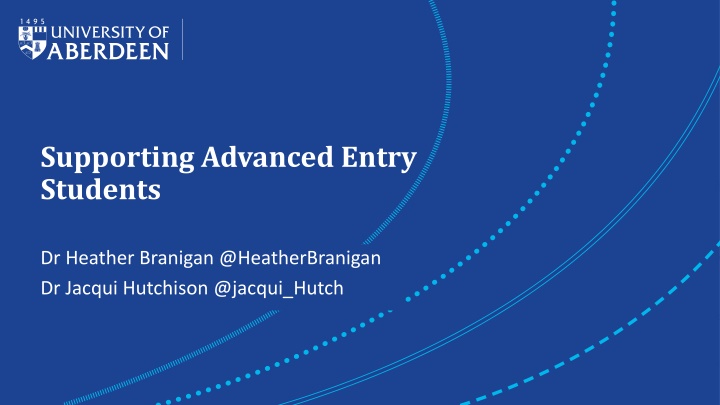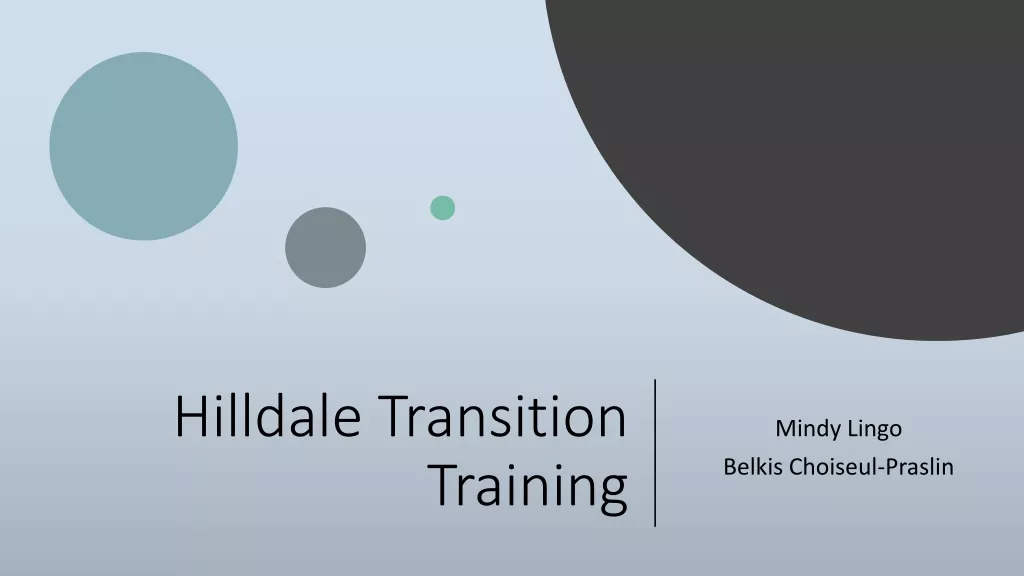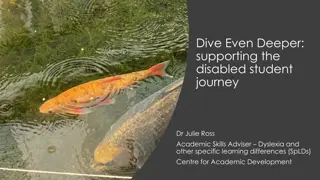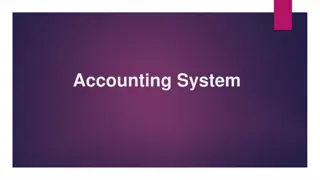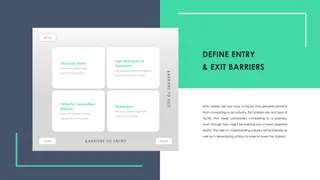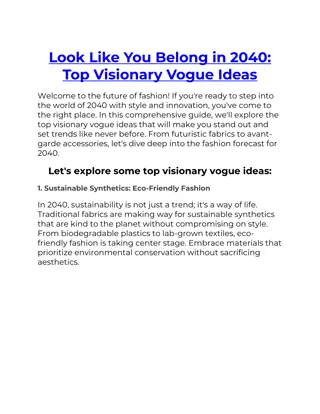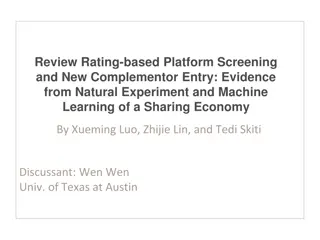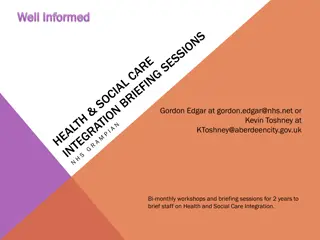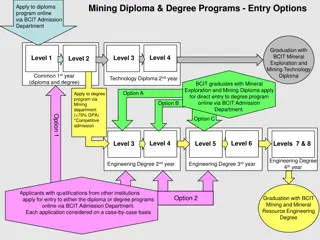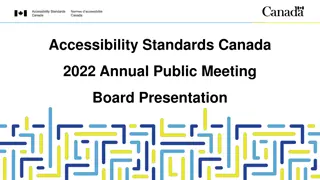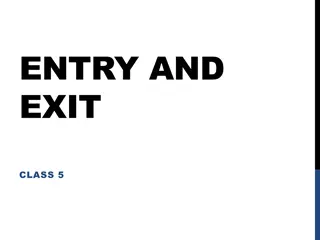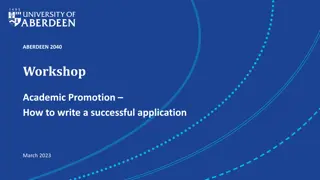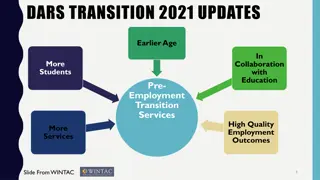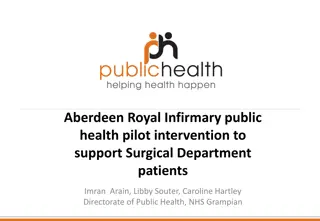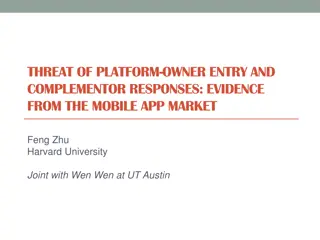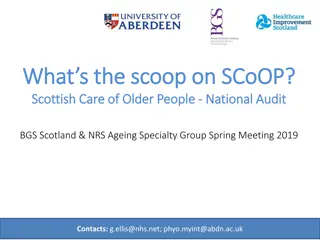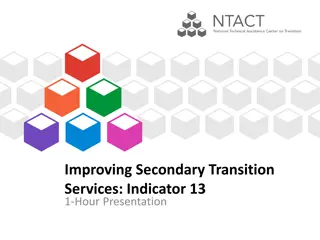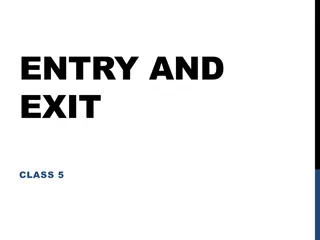ABERDEEN 2040 Research Project on Advanced Entry Students' Transition to University
ABERDEEN 2040 is a research project focusing on the experiences of Advanced Entry students during their transition into university. The project aims to understand the preparedness and support these students receive, with a key focus on academic resilience. Through focus groups and thematic analysis, the project seeks to generate recommendations for better supporting students in their transition.
Download Presentation

Please find below an Image/Link to download the presentation.
The content on the website is provided AS IS for your information and personal use only. It may not be sold, licensed, or shared on other websites without obtaining consent from the author.If you encounter any issues during the download, it is possible that the publisher has removed the file from their server.
You are allowed to download the files provided on this website for personal or commercial use, subject to the condition that they are used lawfully. All files are the property of their respective owners.
The content on the website is provided AS IS for your information and personal use only. It may not be sold, licensed, or shared on other websites without obtaining consent from the author.
E N D
Presentation Transcript
ABERDEEN 2040 Supporting Advanced Entry Students Dr Heather Branigan @HeatherBranigan Dr Jacqui Hutchison @jacqui_Hutch
The Project Team Dr Jacqui Hutchison, School of Psychology Dr Heather Branigan, School of Psychology Dr Sally Middleton, Access and Articulation Team Georgie Minter, Access and Articulation Team Carrie Matson-McArthur, Student Intern Rosalia McIntosh-Prentice, Student Intern Lea Teffner, Student Intern c Funded by the Learning and Teaching Enhancement Programme ABERDEEN 2040
Project Focus Explore the experiences of Advanced Entry students in relation to their transition into (and throughout) university. ABERDEEN 2040
Key questions Who are our students? Advanced entry (AE) students transition into L2/L3 from college The AE route is a pathway for widening access and improving social mobility (National Articulation Forum, 2020). Academic resilience is a key transition skill as described by QAA Scotland. How can we support our students? What do we mean by resilience? How can we build resilience in our communities? ABERDEEN 2040
Background Literature: Transitions Anderson et al. (2000) - Successful transitions requires attention towards students' preparedness and forms of support before, during, and after the transition Griebel & Niesel (2009) - Changes associated with transitions at three levels: Individual (e.g., confidence, self-esteem) Relational (e.g., changing relationships with peers and/or educators) Contextual (e.g., different learning environments, changing curricular expectations). ABERDEEN 2040
Project aims Research Question: What are advanced entry students experiences of preparedness and support in relation to their transition to university? Produce recommendations that can be implemented to support students. Disseminate key findings within own institution and across the sector more widely. ABERDEEN 2040
Method Conducted 12 focus groups using semi-structured interviews. Twenty-five participants across Undergraduate Levels 2 to 4 A total of 9 Further Education colleges were represented. Inductive Thematic Analysis (TA) was used to generate themes. ABERDEEN 2040
Descriptive Themes and Recommendations Led by student intern, Carrie Matson-McArthur In total, 7 themes and 10 recommendations were generated Many refer to the access of information and communication Peer support was highlighted as important to students Strengths of the advanced entry route were highlighted as well as challenges. ABERDEEN 2040
Descriptive Themes and Recommendations Institutional support plays a key role in settling students Induction events for AE Personal tutors, knowledge of AE status Highlighting similarities and differences in course content between college and university Somewhere to ask questions that feel silly Having realistic expectations facilitates preparation Social support is important in reassuring AE students Peer support about what to expect Opportunities to meet other (AE) students ABERDEEN 2040
Latent themes The Goldilocks and the support that is just right unknown unknowns of university Sticking out but not feeling seen ABERDEEN 2040
[at college] they were treating us a little bit like children "felt like direct entry students were thrown into the deep end" "[at college] it did kind of frustrate me getting kind of told off...or just generally talked to patronisingly" I feel like you are really dragged through the trenches at uni There was a tension in student responses between a desire for supportat university that was perceived to be lacking and a frustration at being treated like children in college. ABERDEEN 2040
I just think it was a struggle [to settle in to university]. Yeah, like you know if you look just like any other student. I ll find myself sitting in a lecture and they ll say oh, you've already covered this in first year and then you're like, oh, I've not everyone was kind of looking at me like who is this person? She's new, where has she been for the past two years? Students highlighted a contrast between at times feeling exposed and other as an AE student, whilst also at times feel anonymous at university, with a desire for more personalised contact. ABERDEEN 2040
I was expecting like lecturers to help more and all that, but it was more of a self study and more professionalsetup I would say the unofficial etiquette at the place [university] like when is it OK to contact somebody, how do we address them? Is it OK to go and see them and stuff that it's just, you can't really find written down anywhere" The unknown unknowns of university I didn't realise I was walking into such a big space . the size of the chairs, what you should be bringing in when you're sitting in a lecture Students described feeing ill-prepared to enter university, based on unexpected aspects of the university experience beyond academic content. Such unknown unknowns are reflective of the idea of the hidden curriculum ABERDEEN 2040
Discussion of Themes Key issues relating to expectations, identity and knowledge of AE students Hidden curriculum: what is implicit and embedded in education (Sambell & McDowell, 1998) Role of social capitol (Bourdieu, 1986) in AE student experiences ABERDEEN 2040
Where next? 1. Exploring existing support throughout the university through academic survey 2. Develop student-led content to provide peer support for advanced entry students Support materialsfor students by students Distinguish between 1. Existing support that is accessed 2. Existing support that is not accessed 3. Non-existing but desired support Practical tips and unknown unknowns Disseminate to: Academic schools, Articulation leads, Personal tutors Example formats: Videos, Podcasts, Blogs ABERDEEN 2040
Thank You! We are happy to take any questions or points for discussion heather.branigan@abdn.ac.uk | @HeatherBranigan jacqui.hutchison@abdn.ac.uk | @jacqui_Hutch sally.middleton@abdn.ac.uk | @SallyMidAbdn References Barron, P. & D Annunzio-Green, N. (2009). A smooth transition? Education and social expectations of direct entry students. Active Learning in Higher Education, 10(1): 7 25 Bourdieu, P. (1986). The forms of capital. In M. Granovetter (Ed.), Republished in The Sociology of Economic Life (2018) (pp. 241 258). Braun, V., & Clarke, V. (2006). Using thematic analysis in psychology. Qualitative Research in Psychology, 3(2), 77-101. McGhie, V. (2017). Entering university studies: identifying enabling factors for a successful transition from school to university. Higher Education, 73(3), 407-422. Sambell, K., and L. McDowell. 1998. The construction of the hidden curriculum: Messages and meanings in the assessment of student learning. Assessment and Evaluation in Higher Education 23, 391 402. ABERDEEN 2040
